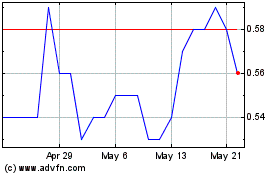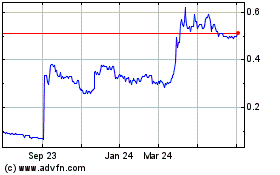Talisker Resources Ltd. (“
Talisker” or the
“
Company”) (TSX:TSK | OTCQX:TSKFF) is pleased to
announce additional high-grade drill results highlighted by
56.88 g/t Au over 1.00 metre at its 100% owned
flagship Bralorne Gold Project.
Key Points:
- Talisker initiated resource
conversion drilling on October 17, 2023, with 15,000 metres of
planned drilling and completed the program on February 15,
2024.
- Hole SB-2024-018 intersected
56.88 g/t Au over 1.00 metres on the BK-9870 Splay
Vein.
- Hole SB-2024-018 also intersected
11.74 g/t Au over 2.15 metres within a broader intercept of
3.31 g/t Au over 11.00 metres on the BK-9870 Vein.
- Hole SB-2024-007 intersected
8.81 g/t Au over 4.15 metres within a broader intercept of
3.34 g/t Au over 17.75 metres on the BK-9870 Vein.
- Hole SB-2024-007 also intersected
8.08 g/t Au over 2.20 metres on the Alhambra
Vein.
- The resource conversion drill
program focused on increasing confidence in the Alhambra, BK and
BK-9870 Veins.
- A total of 81 drill holes were
drilled during the resource conversion program, totaling 14,949
metres.
- All assays have been received from
Q4 2023 and Q1 2024 drilling.
SB-2024-007 Hole
Description
- All assays have been received.
- Located in the King block and
hosted in diorite intrusive.
- Intersected BK-9870 Vein from 55.35
– 59.50 metres.
- Intersected Alhambra Vein from
133.80 – 136.00 metres.
SB-2024-018 Hole
Description
- All assays have been received.
- Located in the King block and
hosted in diorite intrusive.
- Intersected BK-9870 Splay Vein from
245.50 – 246.50 metres.
- Intersected BK-9870 Vein from
283.15 – 285.30 metres.
Major vein structures intersected are considered
classic Bralorne crack-seal quartz-carbonate veins with densely
banded sulphide septae. Crack-seal septae host fine-grained
arsenopyrite and pyrite mineralization. Alteration halos consist of
strong silica-sericite±mariposite alteration halos.
|
Bralorne Gold Project |
|
Drill Hole SB-2024-007 and 2024-018 |
|
Drill Hole Name |
From(m) |
To (m) |
Interval(m) |
Au(g/t) |
Interpreted Structure |
|
SB-2024-007 |
49 |
49.8 |
0.8 |
0.42 |
BK-9870 Vein Halo |
|
SB-2024-007 |
49.8 |
50.3 |
0.5 |
1.52 |
|
SB-2024-007 |
50.3 |
51.1 |
0.8 |
4.30 |
|
SB-2024-007 |
51.1 |
51.6 |
0.5 |
4.86 |
|
SB-2024-007 |
51.6 |
52.25 |
0.65 |
2.72 |
|
SB-2024-007 |
52.25 |
53.5 |
1.25 |
1.03 |
|
SB-2024-007 |
53.5 |
54 |
0.5 |
2.58 |
|
SB-2024-007 |
54 |
54.85 |
0.85 |
0.77 |
|
SB-2024-007 |
54.85 |
55.35 |
0.5 |
2.36 |
|
SB-2024-007 |
55.35 |
55.85 |
0.5 |
43.00 |
BK-9870 Vein |
|
SB-2024-007 |
55.85 |
56.35 |
0.5 |
3.10 |
|
SB-2024-007 |
56.35 |
57 |
0.65 |
4.48 |
|
SB-2024-007 |
57 |
58 |
1 |
3.80 |
|
SB-2024-007 |
58 |
58.9 |
0.9 |
2.14 |
|
SB-2024-007 |
58.9 |
59.5 |
0.6 |
8.11 |
|
SB-2024-007 |
59.5 |
60 |
0.5 |
2.90 |
BK-9870 Vein Halo |
|
SB-2024-007 |
60 |
61 |
1 |
1.67 |
|
SB-2024-007 |
61 |
62 |
1 |
0.94 |
|
SB-2024-007 |
62 |
63.05 |
1.05 |
0.19 |
|
SB-2024-007 |
63.05 |
63.55 |
0.5 |
5.80 |
|
SB-2024-007 |
63.55 |
64.15 |
0.6 |
0.36 |
|
SB-2024-007 |
64.15 |
65 |
0.85 |
0.02 |
|
SB-2024-007 |
65 |
66 |
1 |
1.78 |
|
SB-2024-007 |
66 |
66.75 |
0.75 |
0.63 |
|
|
|
SB-2024-007 |
133.8 |
134.3 |
0.5 |
3.98 |
Alhambra Vein |
|
SB-2024-007 |
134.3 |
134.85 |
0.55 |
21.10 |
|
SB-2024-007 |
134.85 |
135.35 |
0.5 |
3.23 |
|
SB-2024-007 |
135.35 |
136 |
0.65 |
3.94 |
|
|
|
SB-2024-018 |
245.5 |
246 |
0.5 |
0.25 |
BK-9870 Splay Vein |
|
SB-2024-018 |
246 |
246.5 |
0.5 |
113.50 |
|
|
|
SB-2024-018 |
279.5 |
281 |
1.5 |
0.48 |
BK-9870 Vein Halo |
|
SB-2024-018 |
281 |
282 |
1 |
0.58 |
|
SB-2024-018 |
282 |
282.65 |
0.65 |
0.25 |
|
SB-2024-018 |
282.65 |
283.15 |
0.5 |
0.40 |
|
SB-2024-018 |
283.15 |
283.65 |
0.5 |
3.06 |
BK-9870 Vein |
|
SB-2024-018 |
283.65 |
284.3 |
0.65 |
30.20 |
|
SB-2024-018 |
284.3 |
284.8 |
0.5 |
1.71 |
|
SB-2024-018 |
284.8 |
285.3 |
0.5 |
6.46 |
|
SB-2024-018 |
285.3 |
286.3 |
1 |
0.42 |
BK-9870 Vein Halo |
|
SB-2024-018 |
286.3 |
287.8 |
1.5 |
2.20 |
|
SB-2024-018 |
287.8 |
289 |
1.2 |
4.55 |
|
SB-2024-018 |
289 |
290.5 |
1.5 |
0.22 |
|
|
|
Notes: Diamond drill hole SB-2024-007 has a collar orientation of
Azimuth 112; Dip -78. Diamond drill hole SB-2024-018 has a collar
orientation of Azimuth 200.5; Dip -50.5. True widths are estimated
at 40 - 90% of intercept lengths and are based on oriented core
measurements where available. Method Reported includes the most
up-to-date information as of the date of this press release. |
All reported drill assay results are available
on the Company’s website.
For further information, please contact:
|
Terry HarbortPresident and CEOterry.harbort@taliskerresources.com+1
416 357 0227 |
Matt FilgateVice President, Corporate
Developmentmatt.filgate@taliskerresources.com+1 778 679 3579 |
Qualified Person
The technical information contained in this news
release relating to the drill results at the Bralorne Gold Project
has been approved by Leonardo de Souza (BSc, AusIMM (CP) Membership
224827), Talisker’s Vice President, Exploration and Resource
Development, who is a “qualified person” within the meaning of
National Instrument 43-101, Standards of Disclosure for Mineral
Projects.
About Talisker Resources
Ltd.
Talisker (taliskerresources.com) is a junior
resource company involved in the exploration and development of
gold projects in British Columbia, Canada. Talisker’s flagship
asset is the high-grade, fully permitted Bralorne Gold Project
where the Company is currently transitioning into underground
production at the Mustang Mine. Talisker projects also include the
Ladner Gold Project, an advanced stage project with significant
exploration potential from an historical high-grade producing gold
mine and the Spences Bridge Project where the Company holds ~85% of
the emerging Spences Bridge Gold Belt, and several other
early-stage Greenfields projects.
Sample Preparation and QAQC
Drill core at the Bralorne Gold Project is
drilled in HQ to NQ size ranges (63.5mm and 47.6mm, respectively).
Drill core samples are a minimum of 50 cm and a maximum of 160 cm
long along the core axis. Samples are focused on an interval of
interest, such as a vein or zone of mineralization. Shoulder
samples bracket the interval of interest such that a total sampled
core length of not less than 3m both above and below the interval
of interest must be assigned. Sample QAQC measures of unmarked
certified reference materials (CRMs), blanks, and duplicates are
inserted into the sample sequence and makeup 9% of the samples
submitted to the lab for holes reported in this release. ALS Global
performs sample preparation and analyses in North Vancouver,
British Columbia, Canada and SGS Canada in Burnaby, British
Columbia, Canada. Drill core sample preparation includes drying in
an oven at a maximum temperature of 60°C, fine crushing of the
sample to at least 70% passing less than 2 mm, sample splitting
using a riffle splitter, and pulverizing a 250 g split to at least
85% passing 75 microns (ALS code PREP-31 / SGS code PRP89). Gold in
diamond drill core is analyzed by fire assay and atomic absorption
spectroscopy (AAS) of a 50g sample (ALS code Au-AA26 / SGS code
GO_FAA50V10), while multi-element chemistry is analyzed by 4- Acid
digestion of a 0.25 g sample split with detection by inductively
coupled plasma mass spectrometer (ICP-MS) for 48 elements (Ag, Al,
As, Ba, Be, Bi, Ca, Cd, Ce, Co, Cr, Cs, Cu, Fe, Ga, Ge, Hf, In, K,
La, Li, Mg, Mn, Mo, Na, Nb, Ni, P, Pb, Rb, Re, S, Sb, Sc, Se, Sn,
Sr, Ta, Te, Th, Ti, Tl, U, V, W, Y, Zn, Zr). Gold assay technique
(ALS code Au-AA26 / SGS code FAA50V10) has an upper detection limit
of 100 ppm. Any sample that produces an over-limit gold value via
the gold assay technique is sent for gravimetric finish (ALS method
Au-GRA22 / SGS method GO_FAG50V) which has an upper detection limit
of 1,000 ppm Au. Samples where visible gold was observed are sent
directly to screen metallics analysis and all samples that fire
assay above 1 ppm Au are re-analyzed with method (ALS code Au-SCR24
/ SGS code - 6 - GO_FAS50M) which employs a 1kg pulp screened to
100 microns with assay of the entire oversize fraction and
duplicate 50g assays on the undersize fraction. Where possible all
samples initially sent to screen metallics processing will also be
re-run through the fire assay with gravimetric finish provided
there is enough material left for further processing
Caution Regarding Forward Looking
Statements
Certain statements contained in this press
release constitute forward-looking information. The use of any of
the words “could”, “intend”, “expect”, “believe”, “will”,
“projected”, “estimated” and similar expressions and statements
relating to matters that are not historical facts are intended to
identify forward-looking information and are based on Talisker’s
current belief or assumptions as to the outcome and timing of such
future events. Various assumptions or factors are typically applied
in drawing conclusions or making the forecasts or projections set
out in forward-looking information. Those assumptions and factors
are based on information currently available to Talisker. Although
such statements are based on reasonable assumptions of Talisker’s
management, there can be no assurance that any conclusions or
forecasts will prove to be accurate.
Forward looking information involves known and
unknown risks, uncertainties and other factors which may cause the
actual results, performance, or achievements to be materially
different from any future results, performance or achievements
expressed or implied by the forward-looking information. Such
factors include risks inherent in the exploration and development
of mineral deposits, including risks relating to changes in project
parameters as plans continue to be redefined, risks relating to
variations in grade or recovery rates, risks relating to changes in
mineral prices and the worldwide demand for and supply of minerals,
risks related to increased competition and current global financial
conditions, access and supply risks, reliance on key personnel,
operational risks, regulatory risks, including risks relating to
the acquisition of the necessary licenses and permits, financing,
capitalization and liquidity risks, title and environmental risks
and risks relating to the failure to receive all requisite
shareholder and regulatory approvals.
The forward-looking information contained in
this release is made as of the date hereof, and Talisker is not
obligated to update or revise any forward-looking information,
whether as a result of new information, future events or otherwise,
except as required by applicable securities laws. Because of the
risks, uncertainties and assumptions contained herein, investors
should not place undue reliance on forward-looking information. The
foregoing statements expressly qualify any forward-looking
information contained herein.
Figure 1: Plan view showing locations of
SB-2024-007 and 2024-018 in relation to the proposed Mustang Mine
development.
Figure 2: Cross section showing the SB-2024-007
drill hole intersection on the BK-9870 and Alhambra Vein.
Figure 3: Cross section showing the SB-2024-018
drill hole intersection on the BK-9870 Vein.
Photos accompanying this announcement are available
athttps://www.globenewswire.com/NewsRoom/AttachmentNg/a767862f-9760-42f8-ae76-26aa21d6d493https://www.globenewswire.com/NewsRoom/AttachmentNg/437acfcf-ca27-4b87-b75b-e0dc0a313486https://www.globenewswire.com/NewsRoom/AttachmentNg/13433235-fdce-41c8-b92f-14f092060da0
Talisker Resources (TSX:TSK)
Historical Stock Chart
From Dec 2024 to Jan 2025

Talisker Resources (TSX:TSK)
Historical Stock Chart
From Jan 2024 to Jan 2025
